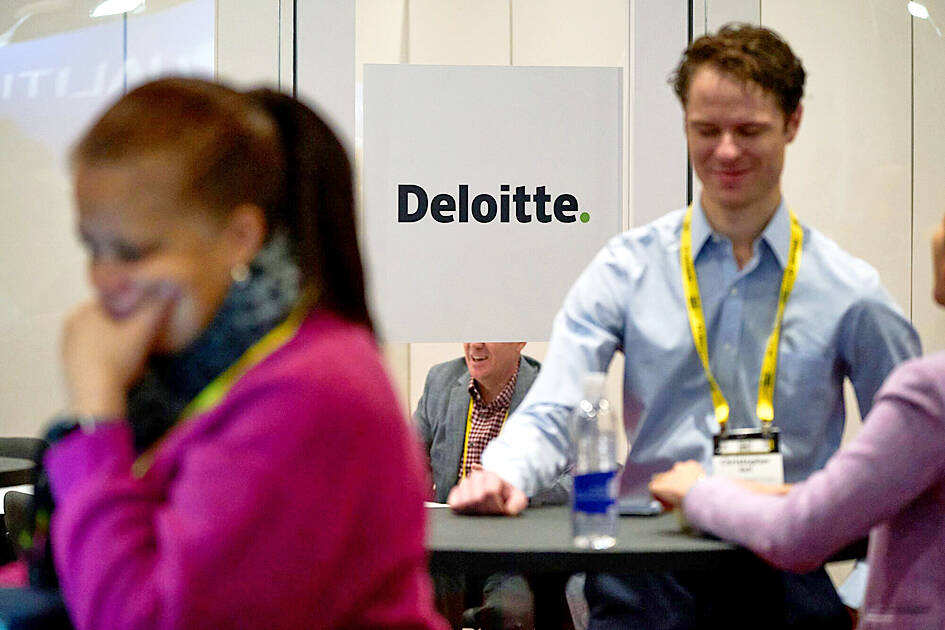The number of initial public offerings (IPO) would pick up this year, driven by high tech and biotechnology firms seeking to grow and upgrade by taking advantage of the local capital market, Deloitte & Touche Taiwan said yesterday.
Deloitte Taiwan’s guarded optimistic outlook came after IPOs last year totaled 45 and together raised a 10-year high of NT$37.9 billion (US$1.213 billion), at odds with a global slowdown amid lingering economic uncertainty and geopolitical tensions.
“The local IPO market has a good chance of flourishing this year, helped by an economic recovery as well as regulatory easing and promotion of the Taiwan Innovation Board, a new platform clustering innovative listings,” Deloitte Taiwan CEO Jason Ke (柯志賢) told a media briefing.

Photo: Bloomberg
Many stock exchanges around the world have lowered listing thresholds to create funding access for innovative companies and Taiwan’s policymakers have rolled out an action plan to achieve similar ends, Ke said.
The number of IPOs could climb to 63 this year, including 24 on the Taiwan Stock Exchange, 24 on the Taipei Exchange and 15 on the Taiwan Innovation Board, the consultancy’s audit and assurance business leader Titan Lee (李東峰) said.
Taiwan is home to the world’s largest suppliers of electronics used in smartphones, high-performance computing, data centers and artificial intelligence (AI) solutions.
The local bourse is attractive in light of regulatory transparency and accountability, procedural ease and competitive underwriting charges, Lee said.
Price-to-earnings ratios in local shares moved up noticeably in the past few years, thanks to the rising importance of Taiwan’s chipmakers on the world stage, government officials said.
The TAIEX last year finished up 26.8 percent with capitalization on the local bourse hitting NT$56.8 trillion and it is expected to reach NT$60 trillion on the back of capital inflows despite weak exports.
Airoha Technology (達發科技), a fabless IC design company and subsidiary of MediaTek Inc (聯發科), the world’s largest 5G smartphone chip designer, raised NT$8.9 billion upon its debut, accounting for a 24 percent share, Deloitte Taiwan said.
Tech firms might continue to dominate the IPO market this year as Taiwanese players command the world’s technology leadership positions and would actively seize business opportunities related to generative AI, Deloitte Taiwan said.
Biotechnology firms would also lend growth momentum in the IPO market, the consultancy said.
Bora Pharmaceuticals (保瑞) and Taidoc Technology Corp (泰博) last year successfully shifted their listing from the Taipei Exchange to the Taiwan Stock Exchange, Deloitte Taiwan said, predicting that peers would launch similar attempts.

SEMICONDUCTORS: The German laser and plasma generator company will expand its local services as its specialized offerings support Taiwan’s semiconductor industries Trumpf SE + Co KG, a global leader in supplying laser technology and plasma generators used in chip production, is expanding its investments in Taiwan in an effort to deeply integrate into the global semiconductor supply chain in the pursuit of growth. The company, headquartered in Ditzingen, Germany, has invested significantly in a newly inaugurated regional technical center for plasma generators in Taoyuan, its latest expansion in Taiwan after being engaged in various industries for more than 25 years. The center, the first of its kind Trumpf built outside Germany, aims to serve customers from Taiwan, Japan, Southeast Asia and South Korea,

Gasoline and diesel prices at domestic fuel stations are to fall NT$0.2 per liter this week, down for a second consecutive week, CPC Corp, Taiwan (台灣中油) and Formosa Petrochemical Corp (台塑石化) announced yesterday. Effective today, gasoline prices at CPC and Formosa stations are to drop to NT$26.4, NT$27.9 and NT$29.9 per liter for 92, 95 and 98-octane unleaded gasoline respectively, the companies said in separate statements. The price of premium diesel is to fall to NT$24.8 per liter at CPC stations and NT$24.6 at Formosa pumps, they said. The price adjustments came even as international crude oil prices rose last week, as traders

POWERING UP: PSUs for AI servers made up about 50% of Delta’s total server PSU revenue during the first three quarters of last year, the company said Power supply and electronic components maker Delta Electronics Inc (台達電) reported record-high revenue of NT$161.61 billion (US$5.11 billion) for last quarter and said it remains positive about this quarter. Last quarter’s figure was up 7.6 percent from the previous quarter and 41.51 percent higher than a year earlier, and largely in line with Yuanta Securities Investment Consulting Co’s (元大投顧) forecast of NT$160 billion. Delta’s annual revenue last year rose 31.76 percent year-on-year to NT$554.89 billion, also a record high for the company. Its strong performance reflected continued demand for high-performance power solutions and advanced liquid-cooling products used in artificial intelligence (AI) data centers,

SIZE MATTERS: TSMC started phasing out 8-inch wafer production last year, while Samsung is more aggressively retiring 8-inch capacity, TrendForce said Chipmakers are expected to raise prices of 8-inch wafers by up to 20 percent this year on concern over supply constraints as major contract chipmakers Taiwan Semiconductor Manufacturing Co (TSMC, 台積電) and Samsung Electronics Co gradually retire less advanced wafer capacity, TrendForce Corp (集邦科技) said yesterday. It is the first significant across-the-board price hike since a global semiconductor correction in 2023, the Taipei-based market researcher said in a report. Global 8-inch wafer capacity slid 0.3 percent year-on-year last year, although 8-inch wafer prices still hovered at relatively stable levels throughout the year, TrendForce said. The downward trend is expected to continue this year,